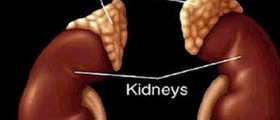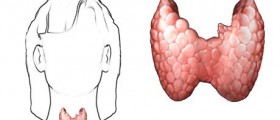
Addison's disease is a serious disorder that occurs due to insufficient amount of hormones produced by the adrenal glands. People suffering from Addison's disease have low levels of cortisol and practically no or very little amount of aldosterone. The condition is also known under the name hypocortisolism and affects both genders equally. Since lack or absence of hormones produced by the adrenal gland can be life-threatening, Addison's disease requires prompt treatment (adequate hormone replacement).
Addison's Disease Clinical Characteristics
In many people Addison's disease progresses slowly (over several months). Once the level of hormones drops significantly patients start developing symptoms and signs such as muscle weakness/fatigue, muscle/joint pains, loss of appetite and subsequent weight loss and hyperpigmentation of the skin. Furthermore, patients may experience salt craving, nausea, vomiting and diarrhea. There is also hypoglycemia, irritability and sometimes depression.
In most severe cases patients end up with acute adrenal failure medically known as addisonian crisis. Such people report pain in the lower back, abdominal pain or pain in legs. There is uncontrollable vomiting and diarrhea both of which are responsible for dehydration. Blood pressure can significantly drop while the level of kalium increases. Sometimes patients lose their consciousness.
Addison's Disease Causes
This disorder develops as a result of damage to the adrenal glands. Damaged glands are not capable to produce sufficient amount of hormones cortisol and aldosterone. These two hormones are of great importance for many organs in the body and this absence or low amount always cause certain imbalance and associated health problems.
Adrenal glands comprise the cortex and the medulla. The medulla is in charge with production of adrenaline-like hormones while the cortex cells produce corticosteroids (glucocorticoids and mineralocorticoids) and androgens. Cortisol belongs to glucocorticoids and aldosterone is a mineralcorticoid. Both of them are essential for life. Cortisol is included in conversion of food fuels into energy, participates in immune system's inflammatory response and helps the body to fight stress while aldosterone maintains balance of sodium and regulated blood pressure.
Primary adrenal insufficiency develops when the very adrenal glands are damaged. Such damage may be of different origin. For instance, the adrenal glands may be damaged due to tuberculosis or other infective illnesses that affect the adrenal glands, secondary spread of cancer to adrenal glands and bleeding into the gland.
Secondary adrenal insufficiency, on the other hand, originates from improper functioning of the pituitary gland, the gland that controls the adrenal glands. The pituitary gland produces ACTH (adrenocorticotropic hormone), a hormone that stimulates the adrenal glands. If there is lack of ACTH, the adrenal glands are not stimulated enough to produce sufficient amount of hormones. Secondary adrenal insufficiency also affects people treated with corticosteroids.
Finally, addisonian crisis is a acute lack of adrenal gland hormones triggered by physical stress, an injury or some infection.

















Your thoughts on this
Loading...